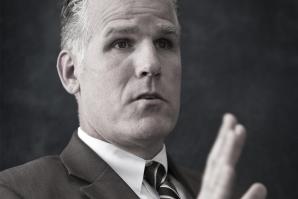Daniel Keen, 54, was named city manager of Vallejo in March 2012. He has worked for seven California cities over a span of 30 years and has held city manager positions for 18 years.
In the city-manager profession, we were all appalled at what was happening in some of the cities around the state. All of us were getting hit pretty hard during the recession, but as we watched some of the real bad situations develop in cities, it put a stain on all of us. Vallejo was one of those situations.”
“I was hired to bring a different attitude and stability to the city. Since bankruptcy, Vallejo has gone through multiple city managers that were very short timers, and the city had a reputation for chaos. I got recruited for this position because I have a reputation for solving problems and setting things straight again. Through the interview process, I became convinced the city was ready to turn things around and change.
“Vallejo is not yet to a point where it is financially stable. We are out of bankruptcy, however we don’t have the balanced budget we need to be able to look forward instead of continuing to have to look back. Our budget still has a structural deficit of around $5 million. That represents the difference between ongoing expenditures and ongoing revenues. That’s pretty significant.
“Today, we are seeing some of the benefits of cost-reduction actions taken by prior councils, but we still have a long way to go. We’re in negotiations with all four of our recognized bargaining units, and we’re seeking significant concessions from those groups to close that gap.”
“But, we have lost the confidence of a lot of the community. A very vocal cadre of people pay close attention to what the council and city staff is doing. They come to all the meetings. They speak out very emotionally and at a very high pitch. They are not going to let the policymakers or city staff act without getting their input and feedback. This is actually very healthy and something the city needs at this time.”
“Despite this lack of confidence, voters did pass a one-cent sales tax increase a couple years ago. The council really struggled with how to spend the money. Ultimately, it was decided it would not be spent on existing services. Instead, it would be earmarked for services that were taken away or not present before. We didn’t throw it into salaries for current employees.”
“One of my top priorities is rebuilding the management team. I inherited a lot of vacant spots. We’re at such a thin level now that we are barely able to provide adequate levels of service. Every department operates on a shoestring budget, and there’s a required pace of work here that I have not experienced anywhere else. We are spread so thin and the demand is so high that some things simply don’t get done.
“We must demonstrate to the community that we have the wherewithal to take care of the most important needs. If we can’t do that then we will again lose the confidence of the community. Then we lose stable residents and the businesses that invest here. Building confidence is how we ultimately get out of this hole.”
“I view myself as the key link between policymakers and the management team. I don’t believe I’m a micro-manager, but I do have my fingers in a lot of different pies. I’m very active with the department heads. I meet with them pretty much on a daily basis. I interact with a lot of people all day long every day. That’s what I like about the job. Otherwise, I’d be bored.”
Recommended For You

Realign. Redevelop.
Counties director Matt Cate thinks California is righting its course
No one can accuse Matt Cate of avoiding the hard jobs. During his four years at the helm of California’s state prisons, he guided the system through some of its toughest times, including historic budget cuts and the implementation of Gov. Jerry Brown’s controversial 2011 realignment plan, which shifted tens of thousands of offenders to local jails and parole supervision.

Sweet Sorrow
California Senate leader Darrell Steinberg prepares for departure
Darrell Steinberg has been front and center on some of the biggest issues facing the state and our region, from historic land-use reform to mental health care funding.We sat down with him to discuss his current legislative priorities and possible future plans as he enters his final year in the Senate.



